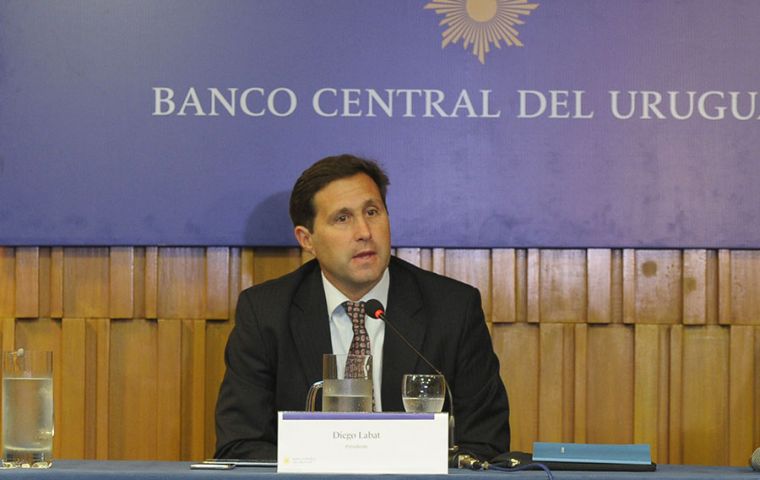MercoPress. South Atlantic News Agency
Uruguay central bank raises “price of money” reference from 4,5% to 5%
 Diego Labat, chairman of the central bank, sanitary situation has improved and the economic activity is bouncing back
Diego Labat, chairman of the central bank, sanitary situation has improved and the economic activity is bouncing back The Uruguayan central bank following the meeting of its Copom, Monetary Policy Committee, decided last week to raise the basic monetary policy rate from 4,5% to 5%, in line with what has been happening in other central banks in the region.
This means that the “price of money,” in pesos, has increased and so will bank credits, loans and other financial assets. Why has this happened? According to Copom, the “sanitary situation” in Uruguay has notoriously improved with over 75% of the population immunized and simultaneously the economic activity has started to show signs of a strong bounce back with robust indicators in several sectors.
“Activity indicators are recovering, several consolidating, and this is a signal that the economic recovery is on the right path”, and the announced opening of borders, step by step, is a clear trend that things are improving“ pointed out the bank's chairman, Diego Labat.
Until now the monetary policy had as the only goal support the economy, provide sufficient liquidity so that the payments chain would not be interrupted, as a consequence of the pandemic and the raft of measures and restrictions to contain it.
Besides another objective of monetary policy is to contain inflation, the sustained increase in the consumer prices index. In effect, the twelve-month inflation to July 2021, was 7,3% still above the government's target range which stands at 3% to 7%, and analysts expectations following surveys are that inflation this year will end at 7,1% and 6,7% in 2022 when the target range has been established at 3% to 6%.
”Expectations are converging to the targets, but still are above, and this is now one of our main concerns“, added chairman Labat.
That is why, ”we thought this was the moment to initiate an exit process from the expansive instance, but the reference rate of 5% we still consider it to be 'expansive' and supportive of the economy“.
Labat said there was too much liquidity in the market and the central bank is withdrawing money with short term options, which he hopes to stretch into longer terms and avoid them from an immediate return to the market.
He anticipated that Copom can be expected to continue to make money dearer in the coming months... ”as long as the sanitary situation continues to improve“, and with the cost of credit rising, taming demand, there should be a reduction of pressure on prices”.
Finally, the ideal estimate for monetary reference should be 'neutral', which means not expansive or contractive, in the range of 2%. With inflation expectations of 6,7% next year, a neutral rate would be in the range of 9%.




Top Comments
Disclaimer & comment rulesCommenting for this story is now closed.
If you have a Facebook account, become a fan and comment on our Facebook Page!